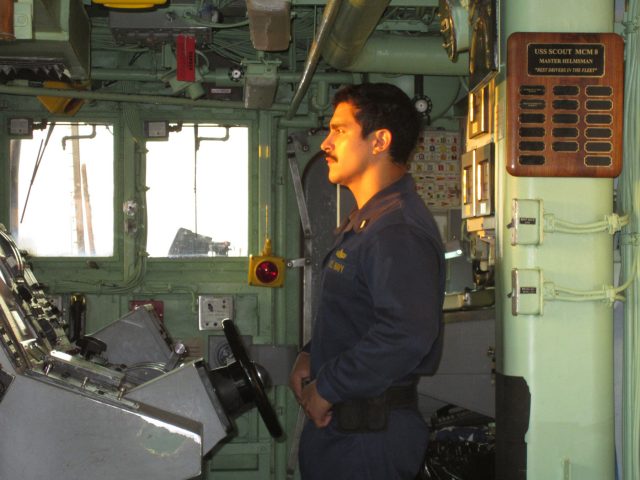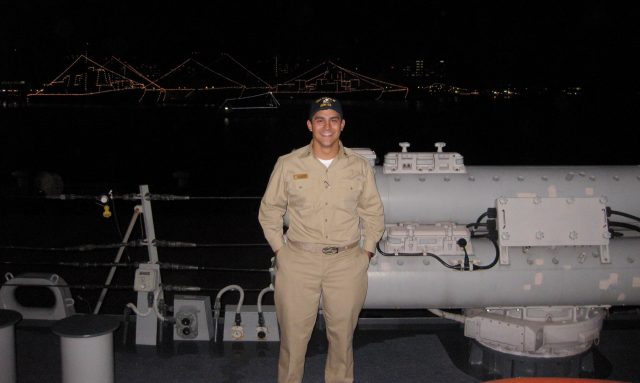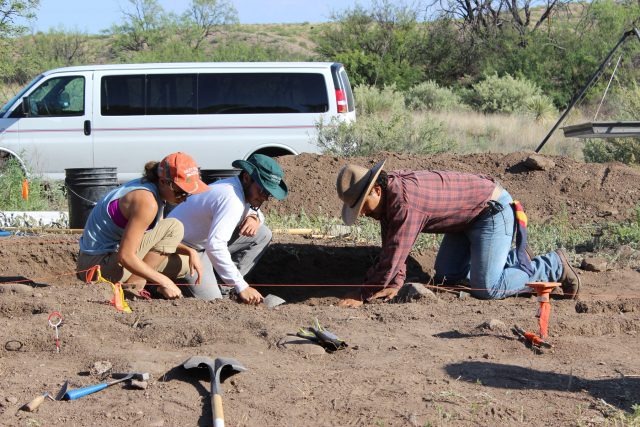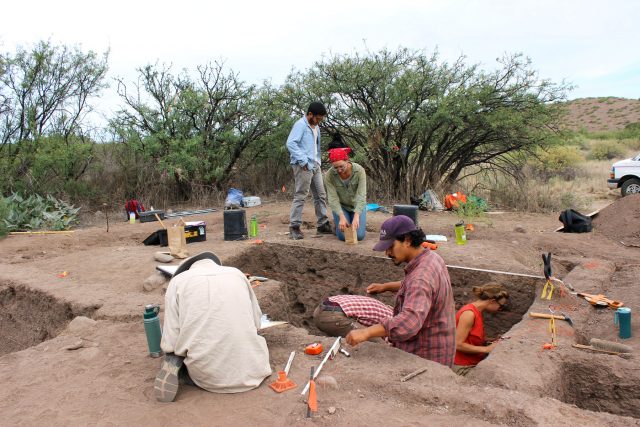- Home
- >
- Preservation Archaeology Blog
- >
- Boats to Trenches
Adam Sezate, University of Arizona and 2016 Preservation Archaeology Field School alumnus
(May 9, 2017)—What does a person with a B.S. in History from the United States Naval Academy do after eight years in the U.S. fleet? During the two years before I turned in my uniform, I asked myself this question every day. The idea of a leaving a steady-paying job with benefits gave me anxiety attacks every coffee break. Still, I realized that the Navy and my undergraduate degree had trained me for more than I expected. I was ready for a career change.

The Naval Academy is renowned for its intellectual prowess and accomplishments in engineering. The core curriculum is very much oriented to develop technical skills in young midshipmen, as one is immediately sent out to a highly technical fleet upon graduation. Unfortunately, this is the impetus behind many criticisms of those who choose to study history, English, or political science. I’ve heard many criticisms over the years—only the privileged study the humanities; there is no relevance to today’s society; those who can’t hack it in a technical degree turn to the humanities—the list goes on.

I can tell you how gas turbine engines propel ships and generate enough electricity to support multimillion dollar equipment, but in the end, that’s not the role of a leader or manager. Strangely, as a naval officer I found that it was not my technical knowledge that contributed to the fleet, but my ability to contextualize, see the bigger picture, and communicate effectively. This is where the humanities and the social sciences truly excel in their training pipelines.
Knowing that I didn’t want to go career in the Navy, I had to make some difficult decisions in my final years. My training in the fleet was geared more for business management in the civilian world, and I really couldn’t see myself doing this right away. I then looked toward my training in the humanities and asked, “What combines a holistic approach to interpreting the past, community engagement, social justice, a chance to explore and discover?”
Archaeology.
I then applied and was accepted to the Master’s in Applied Archaeology program at the University of Arizona.
Archaeology is not simply a group of academics digging for glory (although there are a few like that), but a means to shape the historical context in which we live. This is not a task to be taken lightly; the implications of wrestling with historical problems may have a great impact on contemporary society. History can intentionally or unintentionally marginalize past groups of people and suppress voices that have been crucial to weaving the fabric of American culture. Those who dominate the historical narrative control how we perceive our culture and the culture of others.
Being from the Southwest (Mesa, Arizona), I wonder why I never learned the extensive history of the region in which I was raised. Textbooks in elementary schools cover the “cradle of civilization,” the Greeks, Romans, and everything “Western.” Schools fail to adequately cover the rich histories of Indigenous groups that have lived in the Southwest for millennia. Schools fail to discuss the Indigenous, Spanish, and Mexican influences of this region, influences that transcend the volatile nature of our current political system. We all have different histories, making it that much more important to understand and empathize with one another. This is the foundation of true respect. Applied Archaeology embodies this respect by working with local communities in a collaborative framework, to give people a chance to tell their histories. And there are many histories.

This is one of the main reasons we have the National Historic Preservation Act and gave the President the authority to declare national monuments through the Antiquities Act. Americans have decided that there are culturally significant pieces of our past and landscapes worth preserving. Americans have decided the historic properties in the National Register of Historic Places and in our national monuments and parks are, for all intents and purposes, sacred. Archaeologists have been in the fray, nominating and lobbying for protection of culture and landscapes since the beginning, and they will continue to do so. This is why I support Bears Ears National Monument.
Archaeologists are not perfect, though. Many times, we fail to get our message across effectively to the general public, which is why I am writing this piece. Just like any other profession, there is a spectrum of different types of archaeologist. There are those who never leave the office and prefer to stay within academic circles, and there are those who prefer to connect with communities, work collaboratively, and share histories.

Nonetheless, archaeologists are often classified as “liberal elites,” those who speak down to others from their Ivory Towers. Although such people exist, it is no different than any other profession. Unfortunately, we are easy targets for politicians and businessmen because we are not seen as cash machines for the economy. Though it’s true that there aren’t many rich archaeologists out there, it’s not often heard that archaeology and heritage management is a multimillion-dollar industry, an economic force not to be tossed aside so easily.
Archaeology powerfully shapes our history and culture and helps protect our landscapes. The past is something many take for granted, but it is always within us. And it affects how we connect in a world that is not necessarily more diverse than it was in the past, but is more aware of that diversity.
Explore the News
-
Join Today
Keep up with the latest discoveries in southwestern archaeology. Join today, and receive Archaeology Southwest Magazine, among other member benefits.